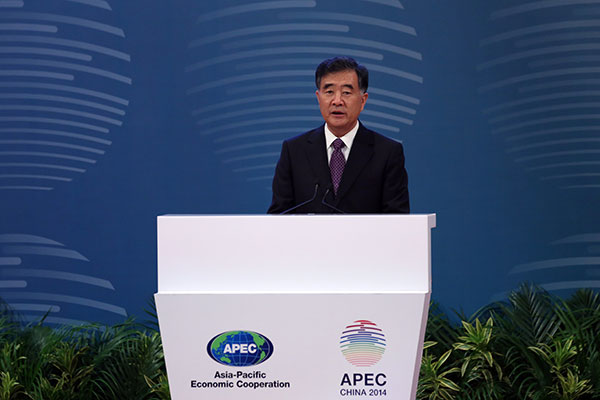
Vice-Premier Wang Yang delivers a keynote speech at the opening ceremony of the eighth APEC Tourism Ministerial Meeting in Macao on Sept 13, 2014.[Photo by Parker Zheng/China Daily]
Measures adopted will keep pace with changing trends, technology
Tourism ministers from APEC economies have adopted measures to ensure that the Asia-Pacific travel and leisure industry keeps pace with changing consumer trends and advances in technology.
New initiatives to support tourist travel and promote smart digital technologies in modern tourism management for sustainable, low-carbon tourism were outlined in the Macao Declaration, which was adopted on Sept 13 by the eighth Tourism Ministerial Meeting of the Asia-Pacific Economic Cooperation.
The meeting was hosted by the China National Tourism Administration and co-organized by the Macao Special Administrative Region.
Making it easier for tourists to travel throughout the region is a high priority. APEC members plan to work on improving visa processes and reducing wait times for tourists at airports to help boost tourism industry growth.
As the changing habits of tourists have introduced new requirements for the industry, APEC members will also work together to boost innovation and promote digital technologies, from smart hotels offering check-in on mobile devices to real-time collection of tourist data for tailoring personalized hotel or sightseeing services.
“Creating a next-generation tourism sector by seamlessly connecting tourists, integrating new digital technologies and offering sustainable tourism destinations is key to maintaining a competitive industry,” said Alan Bollard, executive director of the APEC Secretariat.
Vice-Premier Wang Yang said APEC can meet its new target of 800 million tourists by 2025 by removing barriers and further integrating the Asia-Pacific tourism market.
“China will continue to promote the integration of the APEC tourism market by encouraging its citizens and companies to visit and invest in tourism infrastructure in the APEC region, and by supporting member economies’ promotion of tourism to the Chinese mainland,” Wang said in his opening remarks.
“China will contribute more to the integration by improving visa polices and transportation, such as launching more direct flights and encouraging more cities to adopt visa-on-arrival and visa exemption policies in the future,” he said.
Wang Yanyong, director of the Tourism Development and Planning Research Center at Beijing Jiaotong University, said that to enhance APEC tourism market integration is to meet demand from tourists.
“Tourists tend to choose destinations based on culture clusters, such as China, Japan and South Korea. So cooperation is strongly needed to give them more choices,” he said.
